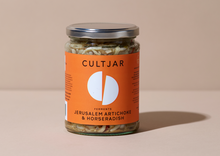***Free local delivery on this new recipe***
This ferment has been produced through collaboration – using Jo Webster’s recipe, Cultjar’s production knowhow and microbial magic. Find out more about Jo at www.jo-webster.com
INGREDIENTS: JERUSALEM ARTICHOKES (78%), FENNEL, RED CHILLI, HORSERADISH (3%), SEA SALT
PLEASE NOTE THAT THE COLOUR OF THIS FERMENT GENERALLY CHANGES FROM A LIGHT YELLOW TO A DARK BROWN. THIS DOES NOT AFFECT THE TASTE OR ANY OTHER ASPECT OF THE RECIPE.
Pairings:
-
With Roast Beef
-
Roast chicken
-
Beetroot
-
Rich Curries / Soups
4 ways to enjoy:
-
In a roast beef sandwich
-
Sprinkle over a beetroot salad.
-
Serve on the side of a hearty curry or soup
- Serve with a creamy bean stew
NUTRITIONAL INFO PER 100G: ENERGY 240kJ / 57 kcal, FAT 0.1g OF WHICH SATURATES 0.0g, CARBOHYDRATES 12g, OF WHICH SUGARS 7.6g, PROTEIN 1.8g, SALT 1.8g
Fermenting, for me is about considering the nutrient profile and the medicinal qualities of the vegetables and herbs I am combining. Jerusalem artichokes are known for their high inulin content. Inulin is a complex carbohydrate and we lack the enzyme needed to digest it ourselves. For this reason, it survives through the stomach and small intestine, reaching our large intestine relatively unchanged. Here, the plethora of microbes living there digest it for us with gusto; Jerusalem artichokes are a fantastic substrate for our resident microbes. These tubers also have a unique delicate, nutty, sweet and earthy tang. By fermenting them, microbial action to digest the inulin begins in the ferment vessel. This enables us to enjoy their flavour and benefit from their inulin content without the unwanted gassy side effects for which they are maligned. As a nutritionist and a fermenter, it comes as no surprise that the ferment I wanted Cultjar to produce was a Jerusalem artichoke one.
The recipe also contains fennel bulb, because its subtle aniseed flavour goes so well with the Jerusalem artichokes. Fennel is also rich in fibre that feeds microbes and supports healthy gut function. Like Jerusalem artichokes, fennel contains a range of vitamins and minerals we need from food for health. Fennel also contains volatile oils, including anethole and fenchone (although the seeds contain much higher levels of these). Apart from tasting delicious, fennel can help to reduce gut spasm and reduce bloating and wind.
Chillies bring with them that warming flush towards the end of the mouthful. They are packed with carotenoids and capsaicinoids. We can’t make carotenoids ourselves and they perform a diverse array of biological functions for us, including acting as powerful antioxidants. The capsaicinoids give chillies their heating pungency and are effective circulatory stimulants with potential to improve blood circulation both in the gut and to our peripheries.
Last, but not least, we have horseradish. Horseradish is part of the brassica family. It is packed with glucosinolates which, once digested by enzymes (that both the horseradish, itself and our microbes produce) form volatile sulphur compounds known to impact liver function, supporting antioxidant and detoxifying processes. Horseradish, like chilli is also a circulatory stimulant. And the flavour it adds to this ferment varies from the potent horseradish tang to a sweeter, richer version of this as the ferment ages.
Through microbial action, this combination is transformed into something quite miraculously indescribable, both in taste terms and in health terms. It is also a potent reminder that fermented vegetables don’t have to involve cabbage.
I try to avoid giving guidance in terms of food pairings for ferments. I don’t want people to think there is a right or wrong way of eating them or that they need to be connoisseurs to enjoy these amazing foods. But I can tell you that I eat this ferment on the side with sandwiches, salads, baked potatoes and curries. I eat it mixed into soups, risottos, and pasta. I eat it as “pickles” with cheese. I eat it by itself and I eat it balanced on a slice of buttered sourdough. I have a couple of tablespoons of one kind of ferment or other with lunch and/or dinner (and sometimes in between!). And I tend to go with the ferment I fancy most at that moment in time, which is my Jerusalem artichoke ferment currently! Jo Webster, Medical Herbalist, Nutritionist, gut microbiota and fermenting specialist.
For more information on the CULTJAR x Jo Webster collab please visit the 'Stories' on this website.
Keep Refrigerated To Control The Fermentation. The Contents May Gently Pop (This Is A Good Thing!) Or Overflow A Little.
All of our Cultjars have beenhandmade in small batches by experienced chefs in our specialist kitchen In Somerset, using excellent quality and nutrient rich produce. We do not use any artificial preservatives and all of our ferments are unpasteurised, which means that they continue to ferment and retain all the good bacteria.




